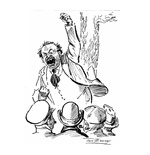
Why Don’t Catholics Evangelize?
They don’t because they’re not given any good reason to do so.
Evangelization, upon which the Church stands or falls, has unfortunately become a mere buzzword in the contemporary Church — it is frequently invoked, it sounds impressive, but it has very little substance. As an example of what’s wrong, let’s consider an article in a Catholic magazine about evangelization.
The article starts out rather well: “Evangelization is the proclamation of Christ and His Gospel by word and example…. The Church’s fundamental mission is to call all people to be reconciled to God through Jesus Christ.”
Then things get murky. We read that “The liturgy and sacraments are tools of evangelization inasmuch as they have the power to invigorate the natural life with supernatural power….” This makes little sense, for in order to receive the sacrament you must already have been evangelized. Yes, to receive Holy Communion may give one the desire to go out and evangelize, but, let’s be honest, that’s rarely seen.
Then there’s a lengthy section on how social justice is essential to evangelization. It may be, but the author does not make his case. He writes: “Interestingly, Matthew 25:25-46 is speaking of the final judgment. Christ does not judge the nations based on whether or how well anyone preached. He asks whether the hungry and thirsty were given food and drink, whether the naked were clothed, and whether the sick or imprisoned were visited.” One could get the impression from this that we are saved exclusively by our good works — surely whoever wrote this knows better. But the problem here is that when we feed the hungry, we are advancing our own salvation, not the salvation of the hungry. So is this really evangelization?
You May Also Enjoy
The word "church" has been replaced with less religious-sounding terms, like worship center, family center, family life center, praise center, or outreach center.
Review of The Closing of the American Mind by Allan Bloom
In decades past there was a reluctance on the part of Latin American Christians committed to “a preferential option for the poor" to criticize the Soviet Union.

